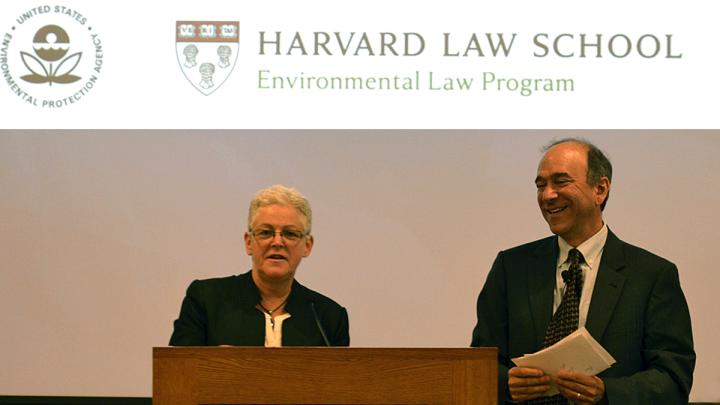Environmental Protection Agency (EPA) Administrator Gina McCarthy affirmed the Obama administration’s commitment to fighting climate change in her first public address since assuming her new role. Her spirited remarks, delivered Tuesday at Harvard Law School, cited past EPA successes as part of a broader argument that measures to control climate change are a necessary part of a “sound economic and global agenda.”
Climate change was the main focus of McCarthy’s inaugural address, echoing the president’s promises of action in his June speech at Georgetown University. The EPA is “front and center” in this renewed environmental agenda—“where we want to be,” said McCarthy, “because we can deliver on those promises.” While praising successes like the Clean Energy Standard Act passed last year, McCarthy also called for more action. She promised that the EPA would collaborate with communities, businesses, faith-based organizations, and NGOs to reduce greenhouse gases while encouraging the development of alternative-energy sources. By taking action, she said, “we can protect the health of our children. We can build a cleaner, more sustainable energy sector, and we can leave behind an environment that, maybe, we’ll be proud of.” Moreover, she warned, “As the climate is changing—and we know that it’s changing—we have to ensure that our communities are resilient enough to adapt to a changing climate.”
McCarthy made the case that environmental action serves the broader public good, citing a wide array of measurable benefits. “Climate change is not an environmental issue,” she declared, “it’s a fundamental economic challenge.” Drawing upon the agency’s 43-year history, she listed past successes in reducing air and water pollutants, emphasizing that they aided rather than slowed economic growth. The Clean Air Act, said the former assistant administrator for the EPA’s Office of Air and Radiation, is estimated to provide a 30-to-1 return on investment by 2020, in part through the prevention of premature deaths, asthma attacks, and childhood respiratory illnesses. “For too long, we’ve been focused on this false choice,” she asserted. “It’s not a choice between the health of our children and the health of the economy. We need to embrace cutting carbon pollution as a way to grow jobs and strengthen the economy. Let’s talk about this positively. Let’s approach this as the opportunity of a lifetime.”
A proud Bostonian, McCarthy applauded New England’s commitment to environmental action: “I marvel at what Massachusetts has done. I congratulate them. I marvel at what the city of Boston has done.” The Boston Harbor cleanup, she said, was a resounding environmental success that opened new economic avenues. (“Right now, that effort has been so successful that I can no longer afford to live in any waterfront property—so I’m a little resentful,” she joked.) More broadly, she said, “Most of the efforts that have been successful so far to reduce carbon have come from my dear states.” She previously served as commissioner of the Connecticut Department of Environmental Protection and has also worked in Massachusetts state government (including as an adviser to Governor Mitt Romney), and she promised to seek community-based solutions. “Local and state officials are leading the charge, and we at the EPA are planning to follow their lead.”
She readily acknowledged the magnitude of the challenges that the EPA faces. Environmental policy, she said, is more like a marathon than a sprint, and the challenges of today “are more complicated than they ever were before.” And the complex issues at hand range from the scientific and technological to the economic and political—a fact that could hardly escape McCarthy, who endured a 136-day fight for Senate confirmation before finally being approved in a 59-40 vote on July 18. Taking the podium, she called her new position “the honor of a lifetime,” adding wryly that the honor was “a very good thing, because I swear it took two lifetimes to get confirmed.” The agency now faces proposed budget cuts of up to one-third (“How about that?” said McCarthy. “Success already!”), as well as fierce political opposition to the Obama climate-change agenda. Though McCarthy’s speech refrained from directly addressing her critics, the impact of the hostile political climate was readily evident. With a debate on the proper role of government raging on Capitol Hill and in the public sphere, she gave the example of the EPA Brownfields programs, which aim to regulate and renew lands containing potentially hazardous materials, to demonstrate how the EPA “uses federal dollars to advance the public interest.” “We are not just about rules and regulations. We’re about getting environmental improvement wherever it makes sense to improve—and frankly, that still is everywhere.”
Six follow-up questions chosen from audience submissions hit on more specific policy issues. A pointed question from the Sierra Club asked how the proposed Keystone XL pipeline could be reconciled with the EPA’s climate-change agenda. (McCarthy, acknowledging the controversy surrounding the issue, jokingly interrupted the question—“it’s been very nice to talk to you”—and pretended to leave the podium.) In keeping with previous comments, her careful answer made no promises about whether the pipeline would be approved: “I think the best the EPA can do is continue to be an honest commenter on the environmental impact statement, which we’ve done our best to do,” she said. There’s an inevitably complex network of interests around environmental issues, and “the EPA does not have all the answers.” Her final comment was both a commitment to action and a recognition of the upcoming challenges: “Climate change will not be resolved overnight, but it will be engaged in the next three years—that I can promise you.”
For more on the new EPA administrator, see the recent New York Times profile.








